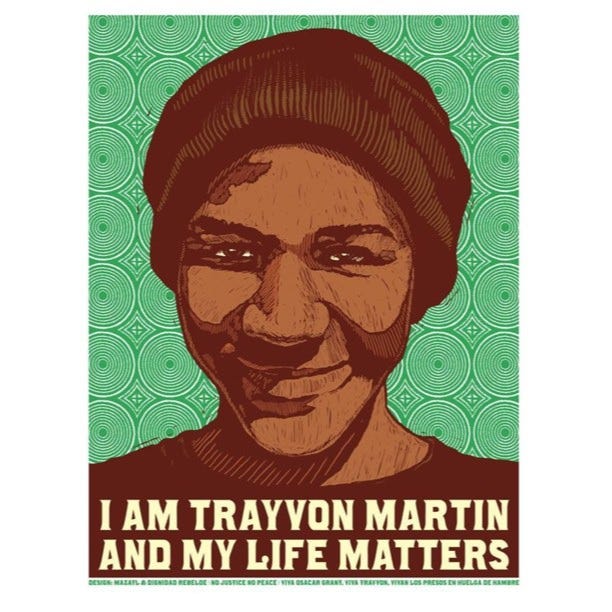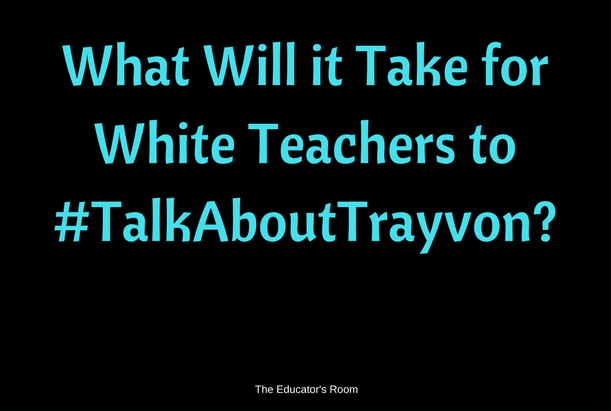
I received an e-mail today from Showing Up for Racial Justice reminding me that today is the 5th anniversary of Trayvon Martin’s death. It is hard to believe five years have passed already. It is sobering to reflect on the growth of the Movement for Black Lives alongside the growing list of hashtag memorializations of unarmed Black men, women, and children in that time.
During this time educators have felt a push by the Movement for Black Lives to recognize and address the impact of white supremacy in our work. Educolor and other education activists have worked tirelessly to start conversations about racism in education, and it seems to be working. There’s more attention now to issues like too few teachers of color, disproportionate suspensions and expulsions of students of color, and racially segregated schools.
And yet, sometimes I wonder if my perception of this progress is somewhat exaggerated, because so much of my education thinking and discussion happens on Twitter and Facebook among mostly like-minded people. Online, hashtags and activism abound, but in the real world I encounter so much silence.
In spite of what feels like a growing movement, it feels like white teachers are standing still. There are plenty of examples of blatantly racist behavior by teachers, but the overwhelming behavior by white teachers seems to be silence and/or discomfort with conversations about racism and racist violence. But roughly 80% of teachers are white, so the only way forward is for more of us to find a voice in this conversation.
In honor of Trayvon Martin, SURJ and Black Lives Matter published a toolkit for white people to #TalkAboutTrayvon.
The toolkit includes conversation starters for white people to use with friends, family members, and colleagues. Here is one that resonated with me when I think about white educators’ silence:
“For those of us who are white, it’s easier to check out and not talk about Travyon Martin, policing, or racial justice. What do you think it would take to get more white people talking about and taking action for racial justice in our community, school, neighborhood, or faith-based community?”
I’ve been thinking about this question for some time. What will it take for more white people and white teachers to start talking?
I’m not asking this question, because I think I’m “woke” or am somehow more enlightened than my fellow white educators. I ask this question, genuinely unsure of the answer. And I ask this question, because I have chosen silence more times than I can remember, and I cannot choose it any more. If I continue to choose silence, I am choosing to cosign the murder of Black men, women, and children.
Ultimately, this is not about a small number of blatantly racist teachers. Nor is it about the teachers fully resistant to addressing race and racism in their classrooms, the ones who avoid the n-word, but label their own students thugs. The question of “what will it take” is not for them.
My question of what it will take is for those of us who want to help, but don’t know how. It’s for those of us who know that Trayvon Martin should still be alive today, and would be if not for systemic racism. For some of us, Trayvon reminds us painfully of students we teach. For others, we may not teach a single student of color, but we still hurt out of basic human decency. But our individual feelings of sadness and shame will not enact change. Whether or not we teach students of color, fighting racism requires more than empathy for the pain of others, it requires us to take responsibility for ourselves. We can only do that when we begin to speak up.
Speaking up will depend on who you are and where you teach. It might mean questioning a parent’s assumptions when they make a comment about Black or Brown kids who get bused to your school. It might mean pushing back when a colleague says, “These kids just don’t care about education,” or, “This stuff is just way too hard for our students. They really just need remediation.” Whether we are challenging the assumptions of community members, colleagues, or ourselves, it is past time to find our collective voice.
A couple of simple questions like, “Why do you say that?” and “Would you say that about a white student?” might go a long way.
There’s a time and a place to have conversations about race and racism with the young people we teach. There are numerous resources out there to support that. But whether or not we’re ready to undertake these conversations with students, we need to tackle them with coworkers. Trayvon Martin is dead. Too many others have died in the five years since his death. What will it take for us to speak up?






